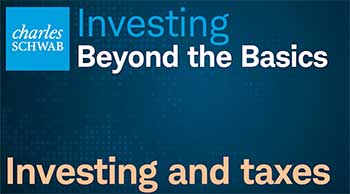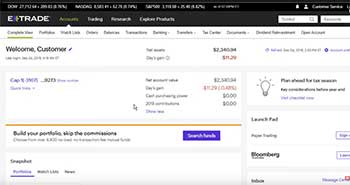When it comes to finding the right financial advisor or brokerage firm, there’s no shortage of options out there. However, Edward Jones has cemented itself as one of the most well-known and respected names in the industry.
Edward Jones was founded in 1922 and now has over 19,000 financial advisors across all 50 states. The company built its reputation by working with individual investors to help them achieve their financial goals through long-term personalized service.
But Edward Jones is far from the only game in town. It faces stiff competition from other established brokerage firms, robo-advisors, and more. So how exactly does Edward Jones stack up against its biggest competitors?
Here’s an in-depth look at how Edward Jones compares to some of the top players in the financial services industry.
A Brief Comparison Table
| Category | Edward Jones | Fidelity |
| Account Minimum | No minimum | No minimum for most accounts |
| Fees | Transaction fees on trades. Managed account fees around 1-1.35% of assets | $0 stock, ETF, and options trades. Low expense ratios on funds |
| Investment Products | Stocks, bonds, mutual funds, annuities, CDs | Stocks, funds, ETFs, options, bonds, CDs, thousands of mutual funds |
| Financial Advice | Dedicated financial advisor provides ongoing advice | Robo-advising or human advisor for fee |
| Locations | Local branch offices | Fidelity has limited branch locations |
| Mobile Apps | Yes | Yes |
| Account Types | Brokerage, retirement, college savings, trusts | Brokerage, retirement, cash management, trusts |
| Trades Execution | Via financial advisor | Self-directed online/mobile trading |
Edward Jones Vs. Vanguard
Vanguard is one of the world’s largest investment companies, best known as a pioneer in low-cost index fund investing. Here’s how the two compares:

Investment offerings
- Edward Jones offers individual retirement accounts, taxable brokerage accounts, college savings plans, insurance products, and more. Their advisors can recommend mutual funds, stocks, bonds, annuities, and other securities to clients.
- Vanguard focuses exclusively on investment products like mutual funds and ETFs. They don’t offer individual stock trading or cash management accounts.
Account minimums
- Edward Jones does not require a minimum account balance. This makes them accessible for new investors.
- Most Vanguard mutual funds require a minimum initial investment between $1,000 and $3,000. Some funds have minimums up to $50,000.
Fees
- Edward Jones charges transaction-based commissions when buying or selling many securities. Managed account fees are around 1% – 1.35% of assets under management.
- Vanguard is known for their ultra-low expense ratios of around 0.05% – 0.30% for most funds. No commissions to buy/sell Vanguard funds and ETFs.
Financial advising
- Edward Jones advisors provide personalized financial planning and retirement advice. They actively monitor accounts and recommend changes over time.
- Vanguard offers limited complimentary advice for larger account balances. No ongoing relationship with a personal advisor.
Verdict: Vanguard may be a better choice for self-directed beginner investors who want to keep costs low. But those wanting in-depth guidance may benefit more from Edward Jones.
Edward Jones Vs. Fidelity
Fidelity is another longstanding brokerage firm helping clients invest for retirement, education, and more. How do they stack up against Edward Jones?

Account types
- Edward Jones offers brokerage accounts, IRAs, college savings, trusts, and other common account types investors need.
- Fidelity also provides a full suite of investment and retirement accounts to meet most needs.
Investment selection
- Edward Jones offers various mutual funds, stocks, bonds, CDs, annuities, and more. Advisors provide recommendations.
- Fidelity allows investing in stocks, ETFs, options, mutual funds, bonds, CDs, and thousands of funds from other companies.
Fees
- Edward Jones charges transaction fees when buying/selling most securities. Managed account fees around 1% – 1.35% of assets.
- Fidelity offers $0 trades on many funds and stocks. Average expense ratios can be lower than Edward Jones’ options.
Financial advising
- Edward Jones advisors provide ongoing personalized advice and account management services.
- Fidelity offers advising services for a fee. Guidance ranges from one-time planning to comprehensive management.
Verdict: Fidelity gives investors excellent DIY tools for building their own portfolios at low cost. But Edward Jones is likely better for those wanting a personal touch.
Also Read: Comparison Between Fidelity And Ameriprise.
Edward Jones Vs. Charles Schwab
Charles Schwab is another deep-rooted investment firm helping clients grow their wealth. How does it compare?
Account minimums
- Edward Jones has no minimum account balance requirements.
- Most Schwab accounts require a $1,000 minimum to open. Some IRAs need just $100.
Products available
- Edward Jones allows investing in stocks, bonds, mutual funds, annuities, insurance, and more.
- Schwab also provides access to individual securities, mutual funds, ETFs, options, futures, and other products.

Costs and Fees
- Edward Jones charges transaction fees and managed account fees around 1% – 1.35%.
- Schwab offers $0 online equity, ETF, and options trades. No account service fees or minimums. Low expense ratios on funds.
Advising approach
- Edward Jones uses a network of local advisors who build personal relationships with clients.
- Schwab provides digital tools for self-directed investing. Advising services available for added fees.
Verdict: Schwab is great for active traders and DIY investors wanting to keep costs low. But Edward Jones offers a more personalized touch.
Edward Jones Vs. E*Trade
E*Trade is an online broker providing tools for investors to trade on their own. How do they compare?
Account offerings
- Edward Jones provides full-service investment and retirement accounts with advisor guidance.
- E*Trade focuses mainly on brokerage accounts for trading stocks, options, ETFs, and mutual funds.
Trading experience

- Edward Jones clients work with advisors who buy/sell on their behalf. No online trading.
- E*Trade offers easy-to-use online/mobile trading platforms and robust research tools.
Costs
- Edward Jones has transaction fees when buying many securities. Managed accounts have around 1% – 1.35% annual fee.
- E*Trade charges $0 per trade for stocks, options, and hundreds of ETFs. Low margin rates and no-account fees.
Advice and guidance
- Edward Jones offers ongoing personal advice from a dedicated advisor. Full financial planning services.
- E*Trade provides guidance from robo-advisors. Some branches have in-person financial consultants.
Verdict: E*Trade is better for active DIY traders wanting low-cost transactions. But Edward Jones caters to those wanting an ongoing advisor relationship.
Edward Jones Vs. Merrill Edge
Merrill Edge is Bank of America’s online brokerage platform. How do the two firms’ offerings shake out?
Account options
- Edward Jones provides individual investing and retirement accounts with advisor help.
- Merrill Edge focuses on self-directed trading and robo-advising for investing accounts.
Investing experience

- Edward Jones clients have advisors who provide recommendations and make trades on their behalf.
- Merrill Edge offers intuitive online and mobile apps for independent investing. Robo-advising available.
Pricing
- Edward Jones charges trade commissions and typical managed account fees around 1-1.35%.
- Merrill Edge offers $0 online stock, ETF, and options trades. Low expense ratios on funds. No account fees.
Financial guidance
- Edward Jones advisors build personal relationships and provide ongoing advice.
- Merrill Edge has robo-advisors or options for dedicated financial advisors (for a fee).
Verdict: Merrill Edge is ideal for active DIY traders wanting discounted trades. But Edward Jones is better for those valuing professional advisor relationships.
Also Read: Comparison Between Acima And Affirm.
Frequently Asked Questions (FAQ)
Edward Jones’ biggest competitors are Fidelity, Charles Schwab, and Vanguard based on assets under management. These large brokerage and investment firms have national reach, offer similar investment products, and serve millions of clients.
The top Edward Jones competitors include:
Fidelity – Brokerage firm providing investment accounts, guidance, retirement services
Charles Schwab – Discount brokerage offering trading platforms and robo-advising
Vanguard – Leading provider of low-cost mutual funds and ETFs
Merrill Edge – Bank of America’s online discount brokerage division
E*Trade – Online broker with trading platforms, research tools, and advice
Some other financial advisor firms that are similar to Edward Jones due to their local office networks and personalized advice include:
Ameriprise Financial
Principal Financial Group
Wells Fargo Advisors
LPL Financial
Raymond James
These wealth management firms focus on face-to-face financial planning and long term advisor relationships, rather than just transactions.
There is no definitive “better” between Edward Jones and Fidelity – it depends on an investor’s needs. Edward Jones is better for those wanting ongoing personalized advice from a local advisor. Fidelity is preferable for self-directed investors focused on low fees and trade costs.
Also Read: Comparison Between Merrill Lynch And Raymond James.
Key Takeaways
When weighing Edward Jones against the top competitors, there are a few key differences to consider:
- Costs – Firms like Vanguard, Schwab, Fidelity and E*Trade offer ultra-low trading fees and fund expenses. Edward Jones charges transaction fees and account management costs are higher.
- Advice – Edward Jones provides dedicated financial advisors who actively monitor accounts. Competitors offer little to no human advice, aside from robo-advisors.
- Investment selection – Edward Jones provides a wide array of securities like stocks, mutual funds, and fixed income. Others focus solely on funds and trading instruments.
- Account types – Most leading firms provide standard brokerages, IRAs, trusts, college savings plans, and more. Edward Jones covers the key account types investors need.
Overall, Edward Jones tends to be better suited for investors wanting ongoing advice and service from a personal advisor. It brings higher costs than discount brokers, but also provides more guidance. Here is a video!
Low-cost brokers like Vanguard and Schwab appeal more to self-directed investors comfortable building their own portfolios. Robo-advisor based options are in the middle ground with digital tools and limited human guidance.
Understanding your needs and priorities is key to finding the right home for your investments. Be sure to closely compare costs, offerings, and services across firms to make the best decision.
Ultimately, identifying your investment approach, desired services, account types needed, and cost preferences will determine which firm may be a better fit. Comparing all offerings in detail is important to make the right choice.
